含有情态动词的肯定句改为一般疑问句
- 格式:ppt
- 大小:1.07 MB
- 文档页数:38
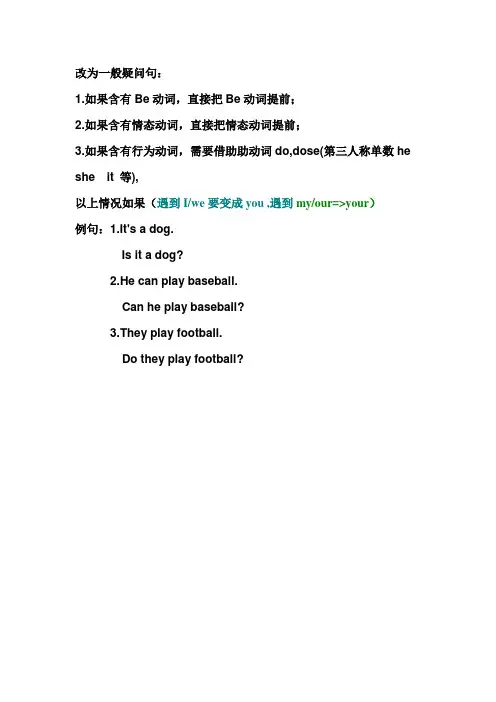
改为一般疑问句:1.如果含有Be动词,直接把Be动词提前;2.如果含有情态动词,直接把情态动词提前;3.如果含有行为动词,需要借助助动词do,dose(第三人称单数he she it 等),以上情况如果(遇到I/we要变成you ,遇到my/our=>your)例句:1.It's a dog.Is it a dog?2.He can play baseball.Can he play baseball?3.They play football.Do they play football?做一般疑问句的肯定回答与否定回答的方法1、含be动词(is am are)或情态动词can的一般疑问句肯定回答用“Y es,主语+be\can.”;否定回答用“No,主语+be\can+not.”;be或情态动词can和not可用缩写形式,主要有isn’t,aren’t,can’t,。
例:(1)问句:Is he strict?肯答:Y es,he is.否答:No,he isn’t.(2)问句:Can you set the table?肯答:Y es,I can.否答:No,I can’t.2、含行为动词(或称为实义动词)的一般疑问句肯定回答用“Y es, 主语+ do\does.”;否定回答用“No, 主语+don not\does not.”;助动词也常用缩写形式,主要有don’t,doesn’t,didn’t等。
例:问句:Do your parents like English?肯定答:Yes,they do.否定答:No,they don’t.。
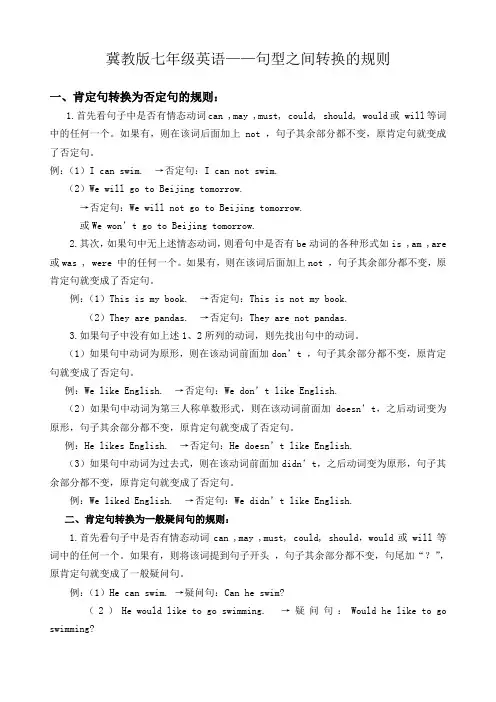
冀教版七年级英语——句型之间转换的规则一、肯定句转换为否定句的规则:1.首先看句子中是否有情态动词can,may,must,could,should,would或will等词中的任何一个。
如果有,则在该词后面加上not,句子其余部分都不变,原肯定句就变成了否定句。
例:(1)I can swim.→否定句:I can not swim.(2)We will go to Beijing tomorrow.→否定句:We will not go to Beijing tomorrow.或We won’t go to Beijing tomorrow.2.其次,如果句中无上述情态动词,则看句中是否有be动词的各种形式如is,am,are 或was,were中的任何一个。
如果有,则在该词后面加上not,句子其余部分都不变,原肯定句就变成了否定句。
例:(1)This is my book.→否定句:This is not my book.(2)They are pandas.→否定句:They are not pandas.3.如果句子中没有如上述1、2所列的动词,则先找出句中的动词。
(1)如果句中动词为原形,则在该动词前面加don’t,句子其余部分都不变,原肯定句就变成了否定句。
例:We like English.→否定句:We don’t like English.(2)如果句中动词为第三人称单数形式,则在该动词前面加doesn’t,之后动词变为原形,句子其余部分都不变,原肯定句就变成了否定句。
例:He likes English.→否定句:He doesn’t like English.(3)如果句中动词为过去式,则在该动词前面加didn’t,之后动词变为原形,句子其余部分都不变,原肯定句就变成了否定句。
例:We liked English.→否定句:We didn’t like English.二、肯定句转换为一般疑问句的规则:1.首先看句子中是否有情态动词can,may,must,could,should,would或will等词中的任何一个。
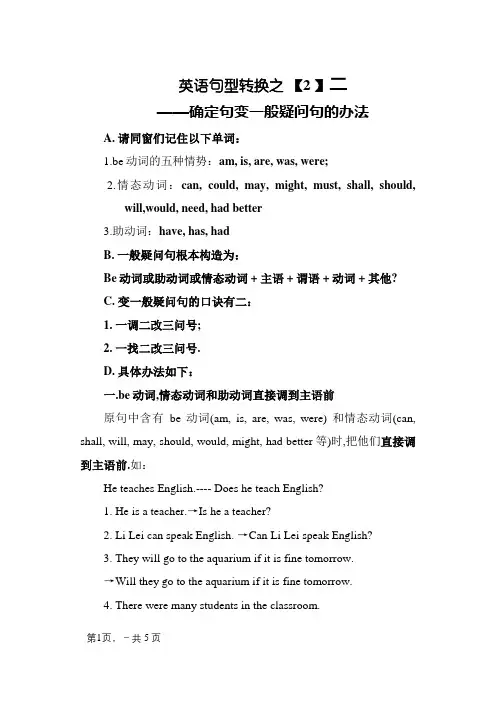
英语句型转换之【2 】二——确定句变一般疑问句的办法A. 请同窗们记住以下单词:1.be动词的五种情势:am, is, are, was, were;2.情态动词:can, could, may, might, must, shall, should,will,would, need, had better3.助动词:have, has, hadB. 一般疑问句根本构造为:Be动词或助动词或情态动词 + 主语 + 谓语 + 动词 + 其他?C. 变一般疑问句的口诀有二:1. 一调二改三问号;2. 一找二改三问号.D. 具体办法如下:一.be动词,情态动词和助动词直接调到主语前原句中含有be动词(am, is, are, was, were) 和情态动词(can, shall, will, may, should, would, might, had better等)时,把他们直接调到主语前.如:He teaches English.---- Does he teach English?1. He is a teacher.→Is he a teacher?2. Li Lei can speak English. →Can Li Lei speak English?3. They will go to the aquarium if it is fine tomorrow.→Will they go to the aquarium if it is fine tomorrow.4. There were many students in the classroom.→Were there many students in the classroom?二.原句中没有be动词.助动词或情态动词时,要依据下面不同情形在主语前加助动词do, does, did.1. 句中第一个动词是本相时,在主语前加上do.如:I get to school at six o'clock every day.→Do you get to school at six o'clock every day?2. 句中第一个动词是三单情势时,在主语前加上does,本来的动词三单情势改为动词本相.如:He teaches English.→Does he teach English?3. 句中第一个动词是曩昔式时,在主语前加上did,本来的动词曩昔式改为动词本相.如:The children had a good time in the park last night.→Did the children have a good time in the park last night?三.确定句变一般疑问句的几点留意1. 确定句变一般疑问句时,除上述变化外,句中其他词语也可能随之转变,如将some改为any,something改为anything, my改为your, I改为you,already.still改为yet等.如:There are some apples in the tree..→Are there any birds in the tree?The dentisthas already seen the moive.→Has the dentist seen the moive yet?2. 须要分清do, does, did, have, has, have, had等是实义动词照样助动词.假如是助动词,则把它们直接调到主语前,假如是实义动词,则在主语前面依据现实情形加do, does或did.如:Mary usually does some readingon Saturdays.→Does Mary usually any readingon Saturdays?(Wrong)→Does Mary usually do any readingon Saturdays?(Right)I have taught English here for two years→Do you have taught English here for two years?(Wrong)→Have you taught English here for two years?(Right)演习题一.填空,把下面的句子变成一般疑问句:1. She is doing some cleaning._____ she doing ________ cleaning?2. They were watching TV at this time yesterday._____ they ________ TV at this time yesterday?3. She goes bicycling twice a week.______ she _____ bicycling twice a week?4. She has to clean the classroom every day._____ she _____ to clean the classroom every day?5. She does morning exercises every day._____ she _____do morning exercises every day?6. We did morning exercises yesterday._____ you _____ morning exercises yesterday?7. The policeman told the boys not to play football in the street. (甘肃省中考题)______ the policeman ______ the boys not to play football in the street?8. I am from Canada._____ _____ from Canada?9. She is looking for her dog._____ she __________ for her dog?10. They are some knives.______ they ______ knives?11.Maria does sports every day._____ Maria _____ sports every day?12. I would like to go with you.______ you ______ to go with me?二.用do,does,be 填空1. _____ she know all the answers ?Yes , she ____ . /No, she _____.2 ._____ the twins often fight ?3. _____ your dad like listening to music?Yes , he ____ . / No, he_____.4._____ uncle Tom wash his car everyday?5. _____ you have a new teacher?Yes , I ______. No, I ______.6._____ she a teacher?Yes, she _____ . No, she _____.7. ______ you playing ball now?Yes, I ______. No, I ______.8. ______ the pig like to sleep?Yes, it ______. No, it _____.9. ______ five birds flying in the sky?Yes, they _____ .No, ____ aren’t.10. _____ your father smoking in the living room? Yes, ____ is .No, he _____.。
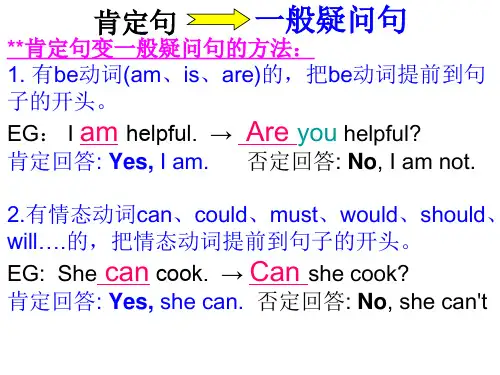
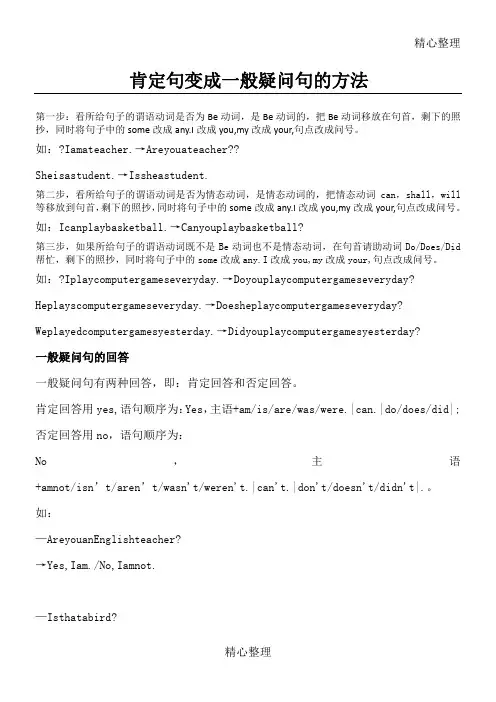
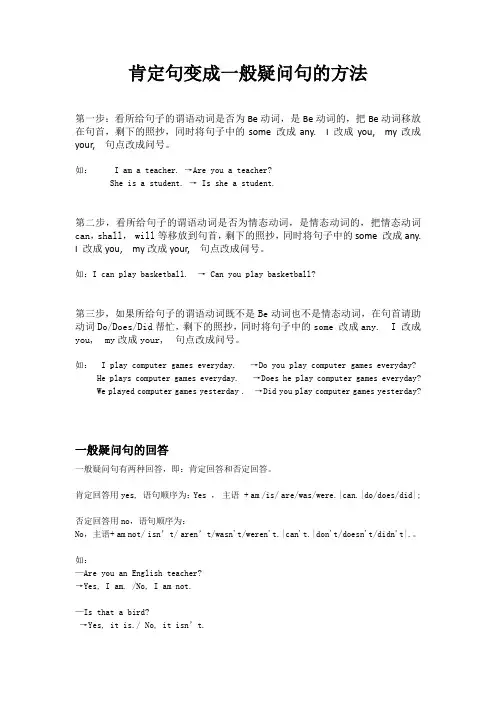
肯定句变成一般疑问句的方法第一步:看所给句子的谓语动词是否为Be动词,是Be动词的,把Be动词移放在句首,剩下的照抄,同时将句子中的some 改成any. I 改成you, my改成your, 句点改成问号。
如:I am a teacher. →Are you a teacher?She is a student. → Is she a student.第二步,看所给句子的谓语动词是否为情态动词,是情态动词的,把情态动词can,shall, will等移放到句首,剩下的照抄,同时将句子中的some 改成any.I 改成you, my改成your, 句点改成问号。
如:I can play basketball. → Can you play basketball?第三步,如果所给句子的谓语动词既不是Be动词也不是情态动词,在句首请助动词Do/Does/Did帮忙,剩下的照抄,同时将句子中的some 改成any. I 改成you, my改成your, 句点改成问号。
如:I play computer games everyday. →Do you play computer games everyday? He plays computer games everyday. →Does he play computer games everyday? We played computer games yesterday . →Did you play computer games yesterday?一般疑问句的回答一般疑问句有两种回答,即:肯定回答和否定回答。
肯定回答用yes, 语句顺序为:Yes ,主语 + am /is/ are/was/were.|can.|do/does/did|;否定回答用no,语句顺序为:No,主语+ am not/ isn’t/ aren’t/wasn't/weren't.|can't.|don't/doesn't/didn't|.。
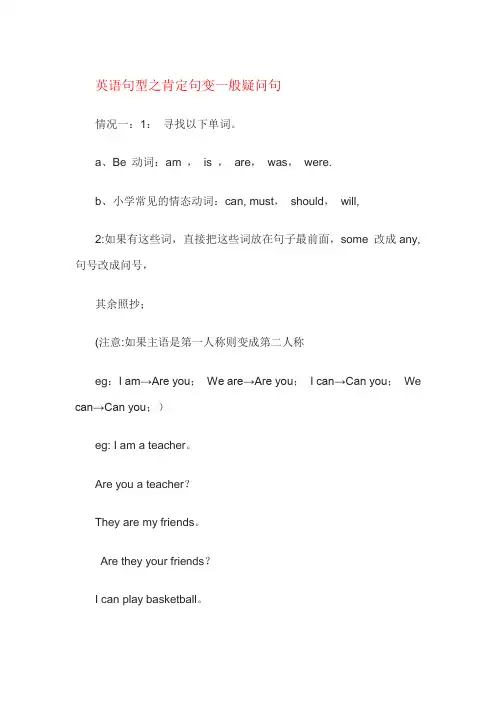
英语句型之肯定句变一般疑问句情况一:1:寻找以下单词。
a、Be 动词:am ,is ,are,was,were.b、小学常见的情态动词:can, must,should,will,2:如果有这些词,直接把这些词放在句子最前面,some 改成any,句号改成问号,其余照抄;(注意:如果主语是第一人称则变成第二人称eg:I am→Are you;We are→Are you;I can→Can you;We can→Can you;)eg: I am a teacher。
Are you a teacher?They are my friends。
Are they your friends?I can play basketball。
Can you play basketball?My sister is watching TV。
Is your sister watching TV?情况二:情况一中单词找不到的句子,在句子前面加助动词do,does,(如何确定助动词用do,does,呢?根据句中动词,动词是原形的就用do,动词是单三形式的就用does)注意:变疑问句时,句中有some,要将some变为any;句中动词用原形.(如果主语是第一人称则变成第二人称)eg:I like the monkeys。
Do you like the monkeys?My sister has a lovely dog。
Does your sister have a lovely dog?I have some bread and milk every morning。
Do you have any bread and milk every morning?。
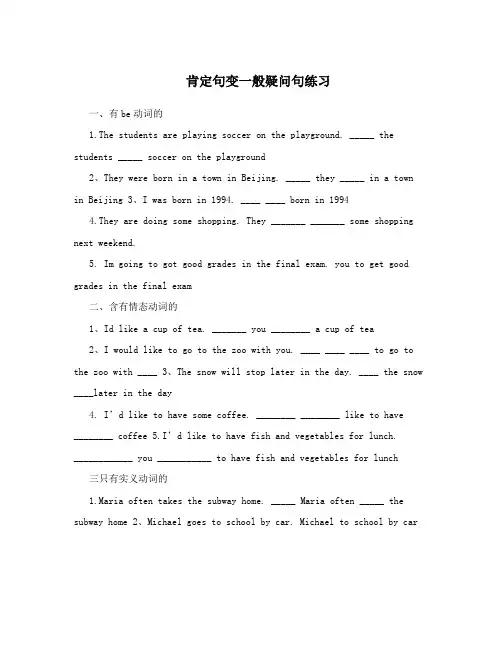
肯定句变一般疑问句练习一、有be动词的1.The students are playing soccer on the playground. _____ the students _____ soccer on the playground2、They were born in a town in Beijing. _____ they _____ in a town in Beijing3、I was born in 1994. ____ ____ born in 19944.They are doing some shopping. They _______ _______ some shopping next weekend.5. Im going to got good grades in the final exam. you to get good grades in the final exam二、含有情态动词的1、Id like a cup of tea. _______ you ________ a cup of tea2、I would like to go to the zoo with you. ____ ____ ____ to go to the zoo with ____3、The snow will stop later in the day. ____ the snow ____later in the day4. I’d like to have some coffee. ________ ________ like to have________ coffee 5.I’d like to have fish and vegetabl es for lunch.____________ you ___________ to have fish and vegetables for lunch 三只有实义动词的1.Maria often takes the subway home. _____ Maria often _____ the subway home 2、Michael goes to school by car. Michael to school by car3、I have some interesting books. ________ you have ________ interesting books4、Lucy recited a Chinese poem at her birthday party. _____ Lucy _____ a Chinese poem at her birthday party5、 I want to be an actor. _________ you ________ to be an actor6、We had a good weekend. ________ ________ _______ a good weekend7、I have to write some letters. ________ you have to ______ _________letters 8、Sue has breakfast at 7 in the morning. ________ Sue _______ breakfast at 7 in the morning 9、They visited the Great Wall last year. ____they____the Great Wall last year 10、They had a good time last Sunday. ____They____ a good time last Sunday 11、Ann felt very happy.____ Ann ____very happy12.Bai Jie likes history very much.___________________________________ 13. He eats breakfast at 7:00._______ he _______ breakfast at 7:00 14.They have to get up early every day. _______they _______ _______ get up early every day 15.The boys used to go fishing by the river. _______ the boys _______ to go fishing by the river 16. Mr Green stays in Shanghai for three days. _______ Mr. Green _______ in Shanghai for three days17.The boys used to go fishing by the river. _______ the boys_______ to go fishing by the river 18. He played tennis last Sunday .__________ he _________tennis last Sunday 19.I had a fever last night_____ you_____ a fever last night 20.Michael has to take care of his little sister. ______ Michael ______ _______ take care of his little sister21、I used to go swimming during the summer vacation. __________ you __________ to go swimming during the summer vacation.22、Our school held a sports meet last week. ____________ yourschool ___________ a sports meet last week四 there be句型1、There are some bikes in the room. ________ ________ ________bikes in the room 2、There are a lot of festivals in China. ____ ___ a lot of festivals in China 五、特殊类1、He did his homework before class. _________ he _________ his homework before class2、Tom does his homework every day. ____Tom____ his homework every day3、She did her homework last night. ____ she ____ her homework last night 4. Tom does his homework every night. ________ Tom ________ his homework every night 5. He does his homework in the evening. ___________ he ____________ his homework in the evening6. Mary did her homework last night. ______ Mary ______ her homework last night 加强记忆口诀:“肯变一,并不难,can 或be提在前;谓语若为行为动,do 或does句首用肯定句改否定句的方法——一步法1、在be动词后加not。
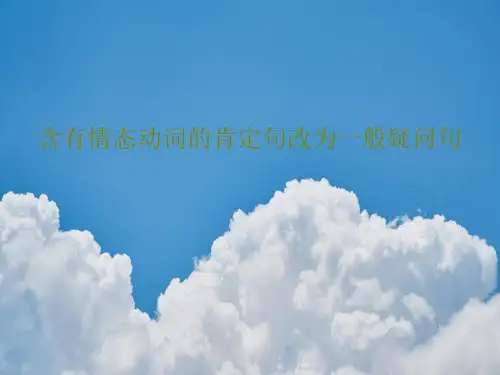
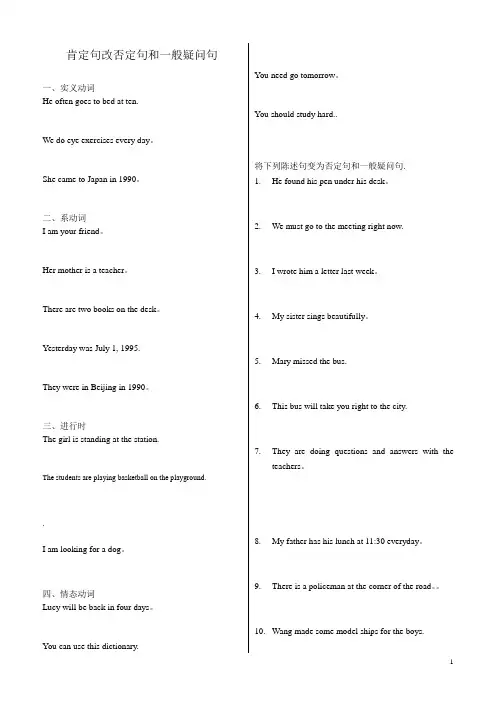
肯定句改否定句和一般疑问句一、实义动词He often goes to bed at ten.We do eye exercises every day。
She came to Japan in 1990。
二、系动词I am your friend。
Her mother is a teacher。
There are two books on the desk。
Yesterday was July 1, 1995.They were in Beijing in 1990。
三、进行时The girl is standing at the station.The students are playing basketball on the playground..I am looking for a dog。
四、情态动词Lucy will be back in four days。
You can use this dictionary. You need go tomorrow。
You should study hard..将下列陈述句变为否定句和一般疑问句.1.He found his pen under his desk。
2.We must go to the meeting right now.3.I wrote him a letter last week。
4.My sister sings beautifully。
5.Mary missed the bus.6.This bus will take you right to the city.7.They are doing questions and answers with theteachers。
8.My father has his lunch at 11:30 everyday。
9.There is a policeman at the corner of the road。
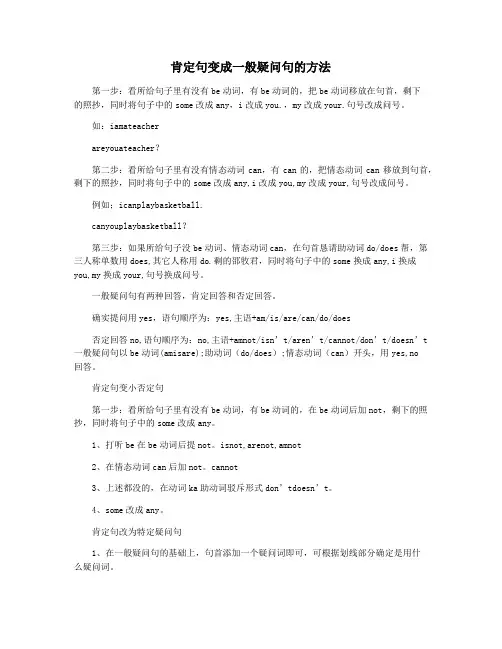
肯定句变成一般疑问句的方法第一步:看所给句子里有没有be动词,有be动词的,把be动词移放在句首,剩下的照抄,同时将句子中的some改成any,i改成you.,my改成your.句号改成问号。
如:iamateacherareyouateacher?第二步:看所给句子里有没有情态动词can,有can的,把情态动词can移放到句首,剩下的照抄,同时将句子中的some改成any,i改成you,my改成your,句号改成问号。
例如;icanplaybasketball.canyouplaybasketball?第三步:如果所给句子没be动词、情态动词can,在句首恳请助动词do/does帮,第三人称单数用does,其它人称用do.剩的邵牧君,同时将句子中的some换成any,i换成you,my换成your,句号换成问号。
一般疑问句有两种回答,肯定回答和否定回答。
确实提问用yes,语句顺序为:yes,主语+am/is/are/can/do/does否定回答no,语句顺序为:no,主语+amnot/isn’t/aren’t/cannot/don’t/doesn’t 一般疑问句以be动词(amisare);助动词(do/does);情态动词(can)开头,用yes,no回答。
肯定句变小否定句第一步:看所给句子里有没有be动词,有be动词的,在be动词后加not,剩下的照抄,同时将句子中的some改成any。
1、打听be在be动词后提not。
isnot,arenot,amnot2、在情态动词can后加not。
cannot3、上述都没的,在动词ka助动词驳斥形式don’tdoesn’t。
4、some改成any。
肯定句改为特定疑问句1、在一般疑问句的基础上,句首添加一个疑问词即可,可根据划线部分确定是用什么疑问词。
2、接着打听be动词或can,放到疑问词后面,若没恳请助动词do/does帮,写下在疑问词后面,howmany除外,必须先写下物品,再写be动词。
肯定句变疑问句的转换规则英语在日常生活中,英语交流中肯定句与疑问句的转换十分常见。
掌握这种转换规则,能使我们更好地与他人进行沟通。
下面将详细介绍如何将英语肯定句转换为疑问句。
首先,我们要了解肯定句变疑问句的基本规则。
一般来说,将肯定句转换为疑问句,需要在句子开头加上助动词(如is,are,do,did等),然后将主语和助动词的距离拉远。
例如:“This is a book.” 可以转换为:“Is this a book?”接下来,我们来了解疑问句的分类和转换方法。
疑问句主要分为一般疑问句、特殊疑问句和选择疑问句。
1.一般疑问句:只需将肯定句中的助动词提到句首,如:“She studies English.” 可以变为:“Does she study English?”2.特殊疑问句:对句子中的特定成分进行提问,如:“He is a teacher.” 可以变为:“What is he?”3.选择疑问句:在肯定句的基础上,给出两个或多个选择,如:“I wil l go to the park or the museum.” 可以变为:“Will you go to the park or the museum?”在转换肯定句为疑问句时,还有一些特殊情况需要注意:1.肯定句中主语为第三人称单数时,助动词要用does,如:“He likes apples.” 可以变为:“Does he like apples?”2.如果是祈使句,疑问句的形式为:“Can you ...?” 或“Couldyou ...?”,如:“Go to the supermarket.” 可以变为:“Can you go to the supermarket?”3.涉及到情态动词的肯定句,疑问句中要用do或does,如:“You must finish your homework.” 可以变为:“Do you must finish your homework?”(注意:在实际应用中,情态动词后的动词一般用原形)总之,掌握英语肯定句向疑问句的转换规则,能帮助我们更加灵活地进行交流。
怎样把英语句子改成一般疑问句英语是一种语言工具,学习英语的最终目标就是能利用这种工具与别人自由流畅的交流。
小编精心收集了把英语句子改成一般疑问句,供大家欣赏学习!把英语句子改成一般疑问句1一、一般疑问句的基本结构1. 如果谓语中有情态动词、助动词或be,将这些词移到主语之前。
如:Can you dance? 你会跳舞吗?Will he go there tomorrow? 他明天去那里?Are you a student? 你是学生吗?2. 如果谓语中没有情态动词、助动词或be,就在主语前加助动词do(does、did) ,原来的动词都用原形。
如:Do you like English? 你喜欢英语吗?Does your brother like English? 你的兄弟喜欢英语吗?Did you sleep well last night? 你昨晚睡得好吗?注:have做助动词时,将其移至主语前;作“有”解时也可以将其移至主语前;不是作“有”解的为行为动词时,其疑问式和其他行为动词一样要在主语前加do(does、did) 。
如:Has he gone to England? 他到英国去了?Have you (=Do you have) a car? 你有汽车吗?Do you have lunch at school? 你是在学校吃中饭的吗?二、一般疑问句的简略回答—Can you swim? 你会游泳吗?—Yes, I can. (No, I can’t) 会。
(不会)—Have you finished your work? 你工作做完了吗?—Yes, I have. (No, I haven’t. ) 做完了。
(还没有。
)—Is this your pen? 这是你的钢笔吗??—Yes, it is. (No, it isn’t) 是的。
(不是。
)三、一般疑问句的否定形式当说话人或是期待肯定的回答或是不期待对方的回答时用否定式。
“肯定句变一般疑问句”解题步骤一、找be动词(am is are,was were)有则直接提前;eg1. He is / was a teacher. =>Is / Was he a teacher? 肯Yes, he is/was否No, he is n’t/was n’t.二、无be动词,则再找情动(can may should must need)有情动则直接将其提前;eg2.I can play soccer. =>Can you play soccer? 肯Yes, I can否No, I can’t. (注:can’t容易多写n)注:need=>根据“情态动词+V原”的共性。
因为: need ①、情态动词:“需要”,后接: V原②、实义动词:“需要”,后接:sth 或 to do sth.eg3. You need see a doctor. =>Must I see a doctor? 肯Yes, you need. 否No, you needn’t.eg4. You need to see a doctor. =>Do I need to see a doctor? 肯Yes, you do n’t. 否No, you do n’t.(eg3中的need根据“情态动词+V原”的共性可以判断是情动,但通常也不提前,要根据语气选择must开头,同样must开头的一般疑问句的否定回答,一般要选择用needn’t或don't have to作答。
eg5.--Must I stay here ? 肯Yes, you must . 否 No, you needn't 或No, you don't have to.三、无be动词,无情动,则再找是否有助动词will,shall,would,have,has,had,有则直接将其提前;注:have,has,had有可能不是助动词,怎么判断?=>根据“完成时态”的结构。
英语肯定句变成普通疑问句巧妙方法之杨若古兰创作一、把be动词(am is are)和情态动词(can, may, must...)放到句首,其它照写. I/we—you, my—your. some—any. 句号酿成问号(?)例如:陈述句: They are in the park. He can play the guitar..普通疑问句: Are they in the park? Can he play the guitar?把以下陈述句改为普通疑问句子.1、My father is listening to music.2. I am a student.3. Li Li can clean the classroom.4. Danny is in the zoo.5. There are some flowers on the desk.6. These are my books.7. He is sweeping the floor.8、You may come in .9、I am going to do my homework .二、借助普通此刻时助动词do/does,第三人称单数用does,其余人称用do;普通过去时助动词did放到句首,其他照写.特别记住:后面的动词必定还原成本相.遇I/we—you, my—your, some —any. 句号酿成问号(?)例如:陈述句: I like the ducks. He likes the dogs.普通疑问句:Do you like the ducks? Does he like the dogs?把以下陈述句改为普通疑问句子.1. He needs some ink.2. She likes making snowmen.3. Su Hai and Su Yang live in a new house.4. I often sing some songs.5. I played football last Sunday.6. Jenny never does housework at home.I did my homework yesterday afternoon .。